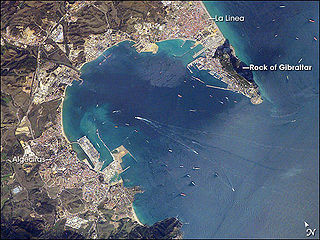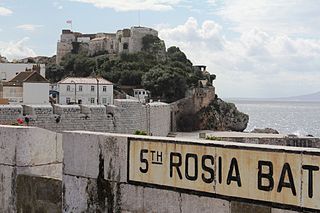The economy of Gibraltar consists largely of the services sector. While being part of the European Union, the British overseas territory of Gibraltar has a separate legal jurisdiction from the United Kingdom and enjoys a different tax system. The role of the UK Ministry of Defence, which at one time was Gibraltar's main source of income, has declined, with today's economy mainly based on shipping, tourism, financial services, and the Internet.

The British Overseas Territories (BOTs) or United Kingdom Overseas Territories (UKOTs) are fourteen territories under the jurisdiction and sovereignty of the United Kingdom. They are remnants of the British Empire that have not been granted independence or have voted to remain British territories. These territories do not form part of the United Kingdom and, with the exception of Gibraltar, are not part of the European Union. Most of the permanently inhabited territories are internally self-governing, with the UK retaining responsibility for defence and foreign relations. Three are inhabited only by a transitory population of military or scientific personnel. They all share the British monarch as head of state.

Operation Flavius was a military operation in which three members of a Provisional Irish Republican Army (IRA) cell were shot dead by undercover members of the British Special Air Service (SAS) in Gibraltar on 6 March 1988. The three—Seán Savage, Daniel McCann, and Mairéad Farrell —were believed to be mounting a car bomb attack on British military personnel in Gibraltar. Plain-clothed SAS soldiers approached them in the forecourt of a petrol station, then opened fire, killing them. All three were found to be unarmed, and no bomb was discovered in Savage's car, leading to accusations that the British government had conspired to murder them. An inquest in Gibraltar ruled that the SAS had acted lawfully, while the European Court of Human Rights held that, although there had been no conspiracy, the planning and control of the operation was so flawed as to make the use of lethal force almost inevitable. The deaths were the first in a chain of violent events in a fourteen-day period. On 16 March, the funeral of the three IRA members was attacked by a loyalist wielding pistols and grenades, leaving three mourners dead. Then, at the funeral of one of the mourners, the IRA shot two undercover British soldiers who had driven into the procession.

Gibraltar, a British Overseas Territory, located at the southern tip of the Iberian Peninsula, is the subject of an irredentist territorial claim by Spain. It was captured in 1704 during the War of the Spanish Succession (1701–1714). The Spanish Crown formally ceded the territory in perpetuity to the British Crown in 1713, under Article X of the Treaty of Utrecht. Spain later attempted to recapture the territory during the thirteenth siege (1727) and the Great Siege (1779–1783). British sovereignty over Gibraltar was confirmed in later treaties signed in Seville (1729) and the Treaty of Paris (1783).

The Gibraltar pound is the currency of Gibraltar. It is pegged to – and exchangeable with – the British pound sterling at par value. Coins and banknotes of the Gibraltar pound are minted or printed by the Government of Gibraltar.

The Bay of Gibraltar is a bay at the southern end of the Iberian Peninsula. It is around 10 km (6.2 mi) long by 8 km (5.0 mi) wide, covering an area of some 75 km2 (29 sq mi), with a depth of up to 400 m (1,300 ft) in the centre of the bay. It opens to the south into the Strait of Gibraltar and the Mediterranean Sea.
The Gibraltar Defence Police (GDP) is a civil police force which guards and enforces law on Ministry of Defence installations in Gibraltar. Prior to 17 December 2009 it was known as the Gibraltar Services Police (GSP). It has 127 sworn officers and 16 civilian personnel.

Lesbian, gay, bisexual and transgender (LGBT) rights have evolved significantly in the past decades in the British Overseas Territory of Gibraltar. Same-sex sexual activity has been legal since 1993 and the age of consent was equalised to 16 in 2012. The Supreme Court of Gibraltar ruled in April 2013 that same-sex couples have the right to adopt. Civil partnerships have been available to both same-sex and opposite-sex couples since March 2014. In October 2016, Gibraltar voted to legalise same-sex marriage. The Civil Marriage Amendment Act 2016 was passed unanimously in Parliament. The law received royal assent on 1 November and took effect on 15 December 2016.

The following outline is provided as an overview of and topical guide to Gibraltar:

The Gibraltar National Museum is a national museum of the history, culture and natural historyof Gibraltar located within the city centre of the British overseas territory of Gibraltar. Founded in 1930 by the then Governor of Gibraltar, General Sir Alexander Godley, the museum houses an array of displays portraying The Rock's millennia-old history and the unique culture of its people. The museum also incorporates the remains of a 14th-century Moorish bathhouse. Its director since 1991 is Prof. Clive Finlayson.

Rosia Bay is the only natural harbour in Gibraltar, the British Overseas Territory at the southern end of the Iberian Peninsula. Formerly referred to as Rosia Harbour, it is located on the southwest side of Gibraltar. Rosia Bay was the site of the Royal Navy Victualling Yard complex which was constructed in the early 19th century, allowing vessels to anchor and obtain provisions, including food and water. Vice Admiral Horatio Nelson obtained supplies for his Mediterranean Fleet at Rosia Bay. It was to that same anchorage that his vessel HMS Victory was towed after Nelson's death in the 1805 Battle of Trafalgar. The area is also the location of gun batteries, including Parson's Lodge Battery at the south end of the bay and Napier of Magdala Battery at the north end. In the 21st century, Rosia Bay was the focus of controversy following the government's demolition of the historic Rosia Water Tanks and construction of the affordable housing development Nelson's View, which necessitated the relocation of the owners of the adjacent 19th century Rosia Cottages.

Gibraltar is a British Overseas Territory located on the southern end of the Iberian Peninsula at the entrance of the Mediterranean Sea. During the early days of the British administration, Gibraltar was maintained primarily as a military outpost with limited attention paid to its role as a trading post. Initially long term settlement of Gibraltar was uncertain but as Spain's power waned it became established as an important base for the British Royal Navy. Throughout the 19th century there was conflict between the competing roles of military and trading posts, leading to tensions between the civilian population and the Governor of the day. Some Governors encouraged the development of the civilian role in government, whilst others regarded it as a nuisance. As a result, compared with other former British colonies, civilian Government in Gibraltar emerged largely in the 20th century as the needs of the civilian population were often considered by Governors as subordinate to the needs of the military. Since World War II, Gibraltarians have increasingly asserted their own individual identity. The Rock's relationship with Spain and the sovereignty dispute continues to affect the Politics of Gibraltar to this day.

Couvreport Battery is an artillery battery in the British Overseas Territory of Gibraltar.

King's Lines Battery is an artillery battery in the British Overseas Territory of Gibraltar. It was originally built along the access path up to the Gate of Granada.

The Rosia Batteries are a group of artillery batteries in the British Overseas Territory of Gibraltar.

The University of Gibraltar is a not-for-profit independent tertiary institution that was established by The University of Gibraltar Act 2015. The Act provides for the establishment or designation of bodies to safeguard the academic standards of the university and to regulate the conduct of its affairs. The Act also grants the university the right and the power to award degrees, diplomas and certificates. The university curriculum portfolio specialises in areas that build on place and partnerships, with a focus on professional engagement and recognition of regional research policy and practice needs, as well as, the building of local capability. In addition, the university has the objective of contributing to Gibraltarian identity, history, current affairs and its role in the future economic, social and sustainable development of Gibraltar.
The British Overseas Territories (BOT) or alternatively, United Kingdom Overseas Territories (UKOTs), are 14 territories under the jurisdiction and sovereignty of the United Kingdom. They are the parts of the British Empire that have not been granted independence or have voted to remain British territories. These territories do not form part of the United Kingdom and, with the exception of Gibraltar, are not part of the European Union. Most of the inhabited territories are internally self-governing, with the UK retaining responsibility for defence and foreign relations. The rest are either uninhabited or have a transitory population of military or scientific personnel.













